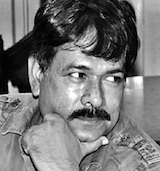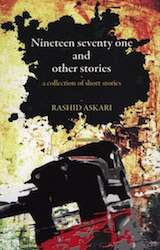Rashid Askari
|
Dr. Rashid Askari is one of the handful of writers in Bangladesh who write both Bengali and English with equal ease and efficiency. Born on 1st June, 1965 in a sleepy little town of Rangpur in Bangladesh, he took an Honours and a Master’s in English from Dhaka University with distinction, and a PhD in Indian English literature from the University of Poona. He is now a professor of English at Kushtia Islamic University. Rashid was born in a sleepy little village called Askarpur situated in in the district of Rangpur in erstwhile East Pakistan (now Bangladesh) during the country’s turbulent history in mid !960s. M. A. Mannan, an expert English teacher and headmaster, was his father and Setara Begum, a naive housewife, is his mother. Rashid showed considerable talent in all levels of learning. He passed the secondary school certificate and higher secondary certificate examinations in 1980 and 1982 with outstanding merit. He received an Honours and a Master’s in English from the University of Dhaka 1985 and 1986 with distinction. He holds a PhD on Nirad C. Chaudhuri and Indian writing in English conducted at the University of Pune in 2005. The University of Dhaka had been the seed-bed of the budding author in him. To his utter shock and horror, he saw the ravages of Bangladesh Liberation War (1971) with a child’s eye, and the sanguinary war has made a tremendous impact on his mind. Dr. Askari had flair for creative writing since his school days. His debut as a writer was marked in 1996 by his book The Dying Homeland. Until recently, he has authored seven books, and edited three volumes of English Writings of Rabindranath Tagore (2012-2013) published in commemoration of the 150th birth anniversary of the poet. He has also written a large number of articles, essays and newspaper columns on a great variety of themes ranging from national to international and colonial to postcolonial, which have been published at home and abroad. One of his stories (Nineteen seventy one) has been published in the Journal of Postcolonial Cultures and Societies (JPCS). His columns have been published in international newspapers like The Daily Star, The Brunei Times, African Herald Express etc. In addition to his scholarly and creative writings, he has considerable journalistic skills. He is the advisor editor of The Kushtia Times. The areas of his academic interest include Modern and Postmodern Fiction, Colonial and Postcolonial Literatures, South-Asian Writing in English, Literary Theories and Creative Writing. His literary work, both in Bengali and English, contains racy stories with surprisingly serious undertones. Picking real-life events from the remote areas and the marginal people of the country and weaving them into various fictional forms are the hallmarks of his storytelling. Though not new in a ground-breaking way, his stories are both intense and original. The overall tone of his language is gently sarcastic.
|

 Birth— 1965
Birth— 1965 Nineteen seventy one and other stories: a collection of short stories
Nineteen seventy one and other stories: a collection of short stories